Electric Vehicles argument
One of National Highways go to comments when asked about pollution is to start saying how many Electric Vehicles there will be on the road by the time LTC opens (if it goes ahead!). This is our response to the so called Electric Vehicle argument (in no particular order).
- EVs still pollute, there’s brake dust, and tyre particulates etc, they are not as clean as some would like you to believe. These tiny particles are known as PM2.5, they are so small they can enter our organs via our bloodstream and can be deadly. PM2.5 is also harmful to wildlife, and pollutes soil and water as well as air.
- If everyone actually made the switch to an EV what on earth would happen to all the old vehicles? There is no away, when it comes to throwing things away. It certainly doesn’t do anything to help the environment to have huge piles of scrapped cars rusting away.
- How long will it take for people and companies to make the move to EVs?
- Where are we in regard to development of Electric HGVs? Plus imagine the cost for HGV fleets to be replaced, not cheap and not going to happen overnight.
- There is not enough clean green energy to support everyone switching over to EVs. More power stations are not good for us or the environment.
- EVs will put further demand on electricity supply, at a time when energy security is a concern, and prices are rising.
- There are not enough charging points available, and even where they are in place many are not working, and/or there are issues with coverage to use apps to charge/pay.
- Where would people be able to plug in at home? Most people have issues finding somewhere to park full stop, let alone somewhere they can then plug their car in to charge.
- Many people have trouble keeping a mobile phone charged for the day, let alone a car!
- There are not enough qualified mechanics to deal with EVs. Most of the ones that are qualified are working for main dealers and likely charge an arm and leg.
- What about the carbon footprint of producing a new car versus keep using your current car? There is some evidence that suggests that CO2 emissions from electric car production are 59% higher than the level in production of traditional internal combustion engine vehicles.
- Roadside recovery has to take extra safety precautions when attending an EV as being electric there is a risk of the vehicles being live, ie electrocution. As well as the most obvious health and safety issues with this, it also means longer time at risk on the roadside during recovery.
- EV fires are extremely difficult to extinguish and release a number of nasty toxic gases. This can be dangerous in normal circumstances, but imagine it in a tunnel like the proposed LTC tunnels. Remember NH/LTC have said that traffic in the tunnels will push the air/pollution through and out of the tunnels, and if traffic slows down fans will automatically come on, which would fan the flames of a fire. EV fires can take longer to put out, and can also reignite (sometimes days after being put out). It takes a lot more water to put out an EV fire, and the then contaminated water pollutes water and soil. Some fire services, including Essex, Kent, and London are now sending two fire engines to EV fires, further impacting stretched emergency services.
- EVs are generally heavier, due to the extra weight from batteries, this increases the impacts of accidents and can lead to more and greater injuries to pedestrians, cyclists, other vehicle users.
- When they have a problem EVs can literally just stop, no warning or time to coast to a safe spot. Not fun or safe at the best of times, now imagine being on a ‘smart’ motorway (or trunk road!) with no hard shoulder or adequate safe places to have your EV stop suddenly.
- There is a lot of toxicity in the EV batteries in production, and when it comes to disposing of them after their limited life. There are not adequate recycling facilities for the batteries.
- The lithium, and other rare earth minerals used for the batteries is finite, meaning there is a limited amount of it available.
- With exemptions and allowances for EVs for things like road tax, congestion charge, ULEZ (Ultra Low Emissions Zone) etc it is likely that any increase in EVs will result in more congestion.
- Plus just in general if people actually believe they are greener there is a risk that they will think it ok to use them more, which will just lead to more congestion on our roads, which will result in certain people and companies saying we need to build more roads, which is never environmentally friendly.
As you can see there are many reasons that Electric Vehicles are not the panacea that many like to believe and claim.
Related
Toxic particles from tyre wear almost 2,000 times worse than from exhausts as weight of cars increases (The Guardian) – click here
Air pollution from brake dust may be as harmful as diesel exhaust on immune cells (Air Quality News) – click here

